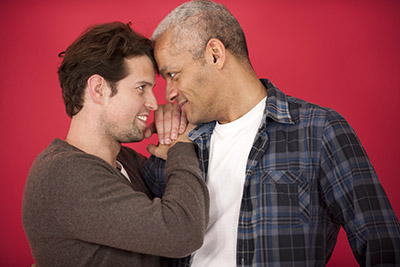365 DAYS OF VALENTINE’S DAY – FOR ALL LOVE!
 According to popular myth, Saint Valentine was a Christian priest in third century Rome who wore a Cupid-shaped ring and handed out paper hearts to people as a reminder of god’s love.
According to popular myth, Saint Valentine was a Christian priest in third century Rome who wore a Cupid-shaped ring and handed out paper hearts to people as a reminder of god’s love.
Emperor Claudius’s II imprisoned Valentine for aiding persecuted Christians and marrying lovers in secret. The Emperor forbade soldiers from marrying, thinking that marriage would hamper the growth and strength of his army. On 14 February, after Valentine refused to convert to Roman paganism, the Emperor had him beheaded. The night before his execution, he left the jailer’s daughter a letter signed, “From your Valentine.”
We can tell similar stories in the 21st century where so many people are persecuted for their love, however these stories are far from myth. Many people are never allowed to show their love, never mind celebrate it on Valentine’s Day. People are imprisoned and often murdered if they do. Those that attempt to show society that love is equal and for everyone, are also criminalised. When people do not conform or ‘convert’ to how some in society define ‘love’, society deems them outcasts, unworthy of equal rights.
This is the case for many queer or Lesbian, Gay, Bisexual, Intersex, Asexual (LGBTIAQ) people in different parts of the world. The violent persecution is currently most visible in Russia, Uganda, Nigeria and now even in India, where state sponsored homophobia has fuelled hate-crimes against LGBTIAQ people, and anyone who supports gender equality and human rights.
It is equally, perhaps less explicitly, violent across Southern Africa, where most countries criminalise love. For instance, in Zambia, loving someone of the same-sex will get you 14 years in prison. Lawmakers in Zimbabwe created a clause criminalising same-sex marriage in the new constitution, which came into effect in 2013.
Queer love is punishable by prison terms ranging from one month to ten years. People across the region also face regular humiliation, harassment and violence and have very limited access to medical care, employment and basic rights.
However, even in South Africa where the constitution bans discrimination and protects queer love, prejudice and hate crimes persist. We can say the same for countries like the Democratic Republic of Congo (DRC), Madagascar and Mozambique where the state may not criminalise love, but it is still taboo and forced into the closet. However, thanks to the recent wave of anti-gay legislation passed by countries across the world, even Mozambique and the DRC have proposed a bill to ban love.
Not only do these love bans also obstruct Cupids arrows, but also the ‘month of love’ remains a very exclusive celebration. Media and retailers play a major role in perpetuating this exclusion and invisibility.
People send billions of Valentines cards every year, making it the second-largest card-sending holiday after Christmas. But, when last did you see a card that was not framed by heterosexuality and gender stereotypes? Every Valentines advert you see is about a man and a woman, and typically, the man bestows upon the woman affection and a bulk of gifts.
The media is such a powerful vehicle of change. Instead of fostering more realistic and fair representations of love, as well as challenging gender-based discrimination, the media perpetuates it. I am yet to see an advert that features same sex couples. But of course, advertisers and retailers, even in South Africa, avoid any ‘controversy’ that may jeopardise their profits.
Valentine’s Day is the perfect occasion to promote love, respect and gender equality. As part of the One Billion Rising campaign, Friday will see people all over the world taking to the streets in protest of widespread gender-based violence. This is a great way to use Valentine’s Day to promote justice and equality, so long as supporters recognise that homophobia and transphobia fuel gender-based violence.
Everyone should be able to celebrate who they are and whom they love, without fear and discrimination, not just on Valentine’s Day, but every single day of their lives. It is up to us to make this possible and to ensure the media, private sector and governments do not define love and perpetuate hate. So, let’s give cupid a break, fight to crush the love bans and let all arrows of love glide free.
Leave a Reply